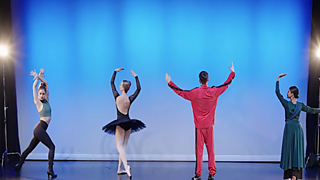- Try
- Rate
- Share
How did you rate this?

The Inside Story
±«Óãtv Development Producer, Nick Hanson, and Tom Dowding, Director at Mobile Pie, explain Mars 2020 for us.
Can you sum up the project?
Mars 2020 is a multiplayer interactive fiction game for adults created by game development studio Mobile Pie. Best played over several days, you cooperate with, and manipulate your friends both in and out of game, navigating your way through the dangers of ship's politics towards a final, desperate decision…
What was the creative process?
The game required a close collaboration between technical, design and writing members of the team. A branching narrative was written by author, Stark Holborn, that needed to be constructed in a very specific format.
The game interface was conceptualised as a mobile device that all crew members aboard the ship would use for their daily work and communications. The narrative of the game is therefore entirely conveyed through content on this device, e.g. emails, transmissions and text/image/audio files.
The exception to this is the use of cutscenes which take the player out of the operating system of the device for brief moments to provide some 3rd person narration. These were included to help provide context for events, clarify the story development and provide dramatic moments.
We put a big emphasis on sound and music to enhance the mood and tension throughout the game, therefore several original pieces of music were created as well as layered ambient sound for the ship.
How was it built?
Mars 2020 was built using Unity and delivered as an APK file to allow users to download the game as an app to an Android device.
The multiplayer aspects used two services - Photon PUN (for real-time multiplayer) and Playfab (for remote storage of game state). Playfab was also used for push notifications. The in-game operating system was built entirely using Unity’s own UI engine.
The branching narrative was designed using a flowchart tool, yEd, and written using Sublime Text Editor, for which we created a custom syntax and colour scheme to help the writer visualise the various elements.
An XML-style specification for each content type (email, character, cutscene) was created by the technical team which was passed on to the writer. This included tags for different elements, e.g. for an email, there would be tags for the sender, subject and body - but also various meta tags that instructed how the content should be presented, e.g. is it relying on another email being read first, is there a time delay, etc. We even extended this to allow certain content items to trigger music or ambient sound.
We also kept an array of flags during play that keeps track of certain events that occurred. These flags could then be referenced in written content to add or omit certain sentences or paragraphs. Therefore the content becomes dynamic based on what has happened before.
These narrative files were stored in an editable folder within the game build - crucially this let the writer edit and re-test without any assistance from the development team.
Any challenges and what were the solutions?
The development of Mars 2020 provided many challenges that were new for Mobile Pie and required creative solutions. The largest of these was the data structure, format, and workflow for the narrative content. The writer needed to be able to specify what, when and where content should be displayed throughout the game. The specification as described above was our solution to this.
The multiplayer aspect was also a challenge. We were unsure whether to think of Mars 2020 technically as a turn-based game or a real-time multiplayer game, as most multiplayer libraries are split in to either category. There are aspects of both and as such the multiplayer solution ended up using both paradigms. For example, the initial game setup and firing of messages between players (e.g. sending of email) required real-time multiplayer engine, but the game needed to be possible to player over a few days if need be. Therefore we kept a remote game state on another service that allowed all players to quit and resume the game. The balance of these two approaches became fairly complex.
There were also numerous editorial challenges around creating an interactive story in which the player influences the narrative whilst attempting to influence other players. One challenge was to branch the story according to the outcome of the vote without writing multiple storylines. The solution was for the story to 'pinch' back and pick up again at certain points regardless of the initial outcome.
Another challenge was to create the functionality to 'influence' other players within the game. We initially wanted to create an open chat feature to allow players to talk to each other remotely to attempt to influence the vote, however this raised issues around moderation of content and data protection. One alternative solution was to provide multiple options for 'conversations' to be sent to other players but this didn't feel natural. We then added other features such as the ability to 'forward' private emails to other players in the hope it would influence them (or potentially backfire!).
We like the idea that the game can be played remotely, but also simultaneously in the same room with friends. If playing together as you might with a board game, there is more scope for ‘influencing’ face-to-face.
We also debated whether to add more obvious game mechanics in the form of ‘scores’ and clear objectives for each character. So for example, the Medical team must keep the ship's health above a certain level. Although this would have added clearer objectives for the players, we were keen to explore a different format with less obvious gameplay and more narrative.
What do you hope to learn from it being on Taster?
Broadly speaking, we’re keen to understand if the ±«Óãtv should be commissioning and publishing more for games aimed at 18 to 35 year olds, especially if they’re not attached to an existing ±«Óãtv television or radio brand.
More specifically we’d like to know what our audience think about this particular format. For example, would they like to have more obvious gameplay in which they can ‘win’ or ‘loose’ and score points, or do they like the idea of playing through a story and seeing where it takes them?
We’re also interested to know how the game was played and how that affected their enjoyment of the game. How does playing alone against an AI compare with playing remotely with strangers or playing in the same room as friends?
What next?
We’re looking forward to seeing the feedback on the game and learning about what worked and what didn’t.
The engine and workflow we’ve created could easily be adapted to another story or game - perhaps there’ll be an opportunity to develop this further or repurpose it for something else!
More new ideas for you on Taster
-

Dance Passion: Beneath Still Waters
Explore the science of motion in this interactive experienceBespoke -

Dance Passion: NOISE
This interactive dance film explores the real-life experiences of people who don't conform to stereotypesBespoke -

Seeking New Gods
Experience Gruff Rhys's Seeking New Gods in 360° audioBespoke
